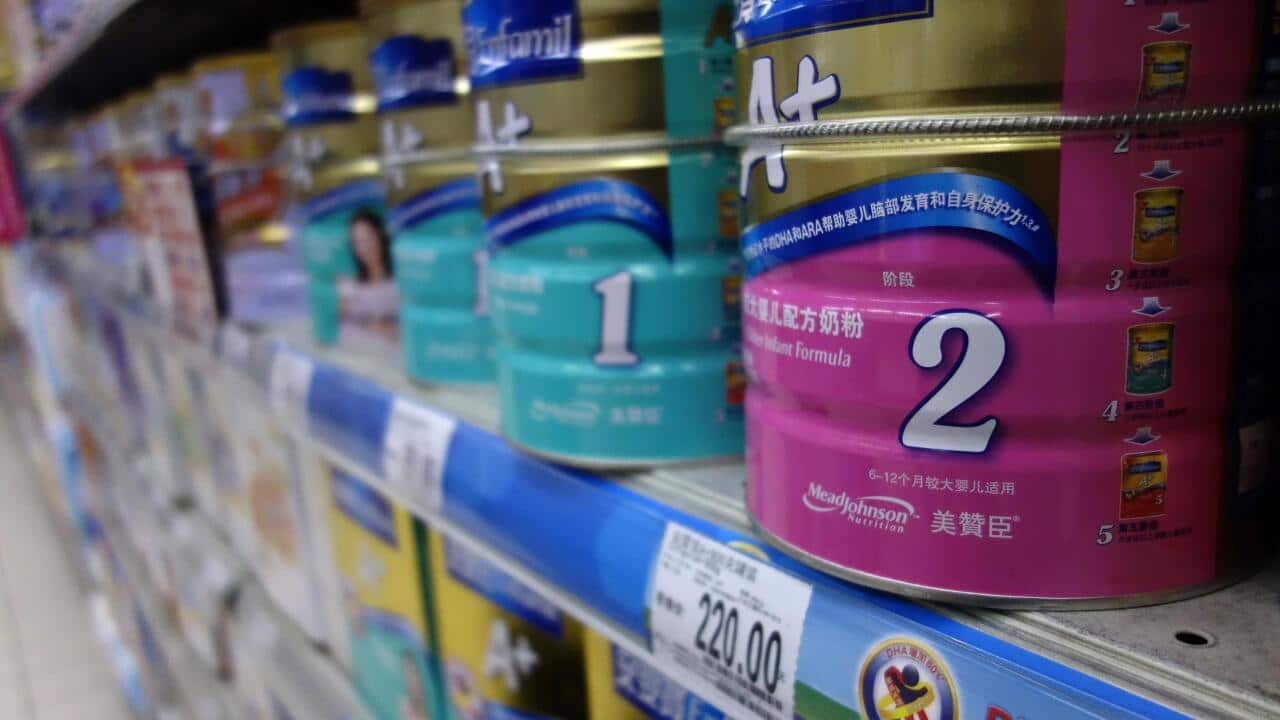Dr Peter Leung, a Chinese-Australian consulting specialist with IVF Australia, told SBS there were a lot of difficulties facing new mums who wished to breastfeed in China.
"Currently the latest statistics show that roughly about 50 to 60 per cent of the new mums will try breastfeeding while they are still in hospital but then that rate drops very quickly," he said.
"[After] roughly about three or four months once the child’s been born only about 30 per cent of the patients would usually be exclusively breastfeeding their kids.
"And that rate drops even further to roughly about 10 to 15 per cent after about six months. Unfortunately that’s been a major problem within most parts of China."
Australian parents are currently experiencing a and blame has been levelled at people who bulk buy tins of formula to sell to China at vastly inflated prices.
have led to Chinese parents seeking out overseas formula, including Australian brand Bellamy's Organic, in large quantities believing it will be safer for their babies.
Dr Leung said everything from work stresses to formula marketing contributed to the demise of breastfeeding and popularity of formula for Chinese mothers.
"The exact reason is still under exploration because there hasn’t been a lot of research or data coming out of China at the moment, but what we understand is actually a bit of push and pull factors in a sense," he said.
"Most of the time [mothers] work in the city and their kids are actually living with their parents ... to be looked after and sometimes it’s just not practical for them to bring the baby back to the major city where they work."
He said other factors such as the lack of sufficient maternity leave and public nursing facilities, as well as a lack of support turned mothers off breastfeeding.
Advertising from formula companies also encouraged mothers to lean towards bottle feeding, along with concerns their babies were not getting enough when they were breastfeeding, Dr Leung said.
WHO figures from the organisation's show an average of 28 per cent of babies in China were exclusively breastfed to six months, based on numbers between 2007 and 2014.
Figures for Australia were not included in the report, but other countries that sat below China in breastfeeding rates for the same period included Belgium (12 per cent), Canada (26 per cent), Denmark (17 per cent), the US (19 per cent) and Vietnam (17 per cent).
Countries with some of the highest rates included the Sri Lanka (76 per cent), Malawi (71 per cent), Nepal (70 per cent), Rwanda (85 per cent) and Peru (72 per cent).
Statistics from the showed only 15 per cent of babies were exclusively breastfed to five months, but about 60 per cent of babies were still receiving some breastmilk at the same age.
"Overall the attitude to breastfeeding in China is actually positive, it’s just we need to correct the social environment as well as having enough support as well as changing the hospital as well as the general policy so that the mums that would like to breastfeed their kids will have full support in order to correct this major problem in China."
Dr Jennifer James from RMIT in Melbourne said the low level of breastfeeding in China was "a tragedy".
"Formula is a product that when a baby has nothing else, there are no other options, it’s a necessity," she said.
"But it should never be seen as the norm, and unfortunately, when you’re seeing the sorts of breastfeeding rates we’re seeing in China now it would appear that formula is becoming the norm."
Related reading

Parents' fury over baby formula bulk buying
Dr James said breastfeeding rates in Australia were also below the World Health Organisation's recommendations of exclusive breastfeeding for six months.
"We do very well in terms of initiation – depending on which area of Australia up to 96 per cent of women will start breastfeeding and the majority of women know how important breastfeeding is for their babies, so most will start," she said.
"But they get let down in a whole lot of ways after the birth of a baby."



